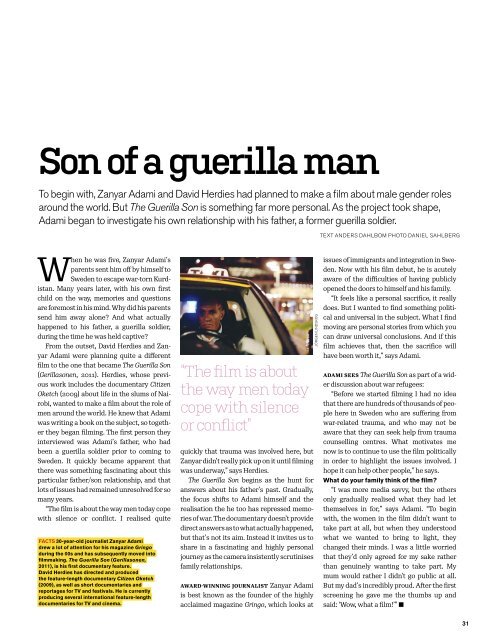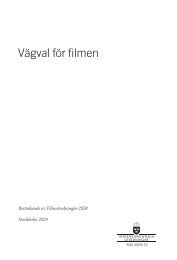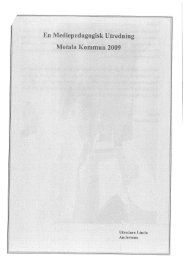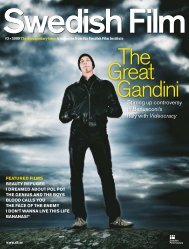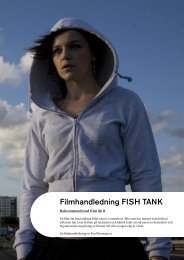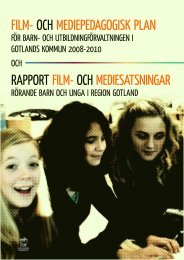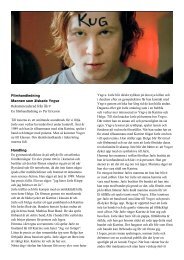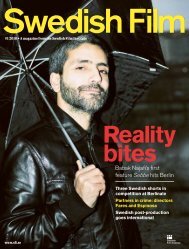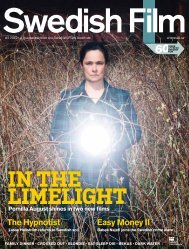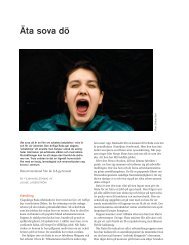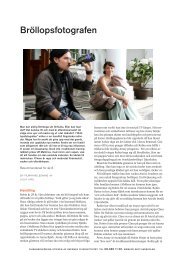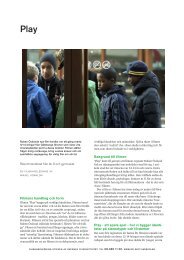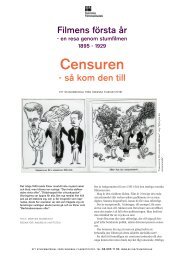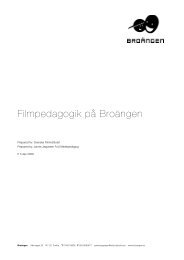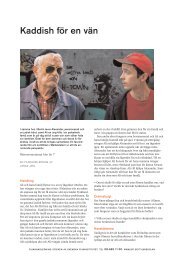Love and murder - Swedish Film Institute
Love and murder - Swedish Film Institute
Love and murder - Swedish Film Institute
You also want an ePaper? Increase the reach of your titles
YUMPU automatically turns print PDFs into web optimized ePapers that Google loves.
son of a guerilla man<br />
To begin with, Zanyar adami <strong>and</strong> david herdies had planned to make a film about male gender roles<br />
around the world. but The Guerilla Son is something far more personal. as the project took shape,<br />
adami began to investigate his own relationship with his father, a former guerilla soldier.<br />
When he was five, Zanyar Adami’s<br />
parents sent him off by himself to<br />
Sweden to escape war-torn Kurdistan.<br />
Many years later, with his own first<br />
child on the way, memories <strong>and</strong> questions<br />
are foremost in his mind. Why did his parents<br />
send him away alone? And what actually<br />
happened to his father, a guerilla soldier,<br />
during the time he was held captive?<br />
From the outset, David Herdies <strong>and</strong> Zanyar<br />
Adami were planning quite a different<br />
film to the one that became The Guerilla Son<br />
(Gerillasonen, 2011). Herdies, whose previous<br />
work includes the documentary Citizen<br />
Oketch (2009) about life in the slums of Nairobi,<br />
wanted to make a film about the role of<br />
men around the world. He knew that Adami<br />
was writing a book on the subject, so together<br />
they began filming. The first person they<br />
interviewed was Adami’s father, who had<br />
been a guerilla soldier prior to coming to<br />
Sweden. It quickly became apparent that<br />
there was something fascinating about this<br />
particular father/son relationship, <strong>and</strong> that<br />
lots of issues had remained unresolved for so<br />
many years.<br />
“The film is about the way men today cope<br />
with silence or conflict. I realised quite<br />
Facts 30-year-old journalist zanyar adami<br />
drew a lot of attention for his magazine Gringo<br />
during the 00s <strong>and</strong> has subsequently moved into<br />
filmmaking. The Guerilla Son (Gerillasonen,<br />
2011), is his first documentary feature.<br />
david Herdies has directed <strong>and</strong> produced<br />
the feature-length documentary Citizen Oketch<br />
(2009), as well as short documentaries <strong>and</strong><br />
reportages for tv <strong>and</strong> festivals. He is currently<br />
producing several international feature-length<br />
documentaries for tv <strong>and</strong> cinema.<br />
“The film is about<br />
the way men today<br />
cope with silence<br />
or conflict”<br />
quickly that trauma was involved here, but<br />
Zanyar didn’t really pick up on it until filming<br />
was underway,” says Herdies.<br />
The Guerilla Son begins as the hunt for<br />
answers about his father’s past. Gradually,<br />
the focus shifts to Adami himself <strong>and</strong> the<br />
realisation the he too has repressed memories<br />
of war. The documentary doesn’t provide<br />
direct answers as to what actually happened,<br />
but that’s not its aim. Instead it invites us to<br />
share in a fascinating <strong>and</strong> highly personal<br />
journey as the camera insistently scrutinises<br />
family relationships.<br />
AwArd-wInnIng journAlIst Zanyar Adami<br />
is best known as the founder of the highly<br />
acclaimed magazine Gringo, which looks at<br />
JörGen lindskoG<br />
TexT <strong>and</strong>ers dahlbom phoTo daniel sahlberG<br />
issues of immigrants <strong>and</strong> integration in Sweden.<br />
Now with his film debut, he is acutely<br />
aware of the difficulties of having publicly<br />
opened the doors to himself <strong>and</strong> his family.<br />
“It feels like a personal sacrifice, it really<br />
does. But I wanted to find something political<br />
<strong>and</strong> universal in the subject. What I find<br />
moving are personal stories from which you<br />
can draw universal conclusions. And if this<br />
film achieves that, then the sacrifice will<br />
have been worth it,” says Adami.<br />
AdAmI sees The Guerilla Son as part of a wider<br />
discussion about war refugees:<br />
“Before we started filming I had no idea<br />
that there are hundreds of thous<strong>and</strong>s of people<br />
here in Sweden who are suffering from<br />
war-related trauma, <strong>and</strong> who may not be<br />
aware that they can seek help from trauma<br />
counselling centres. What motivates me<br />
now is to continue to use the film politically<br />
in order to highlight the issues involved. I<br />
hope it can help other people,” he says.<br />
What do your family think of the film?<br />
“I was more media savvy, but the others<br />
only gradually realised what they had let<br />
themselves in for,” says Adami. “To begin<br />
with, the women in the film didn’t want to<br />
take part at all, but when they understood<br />
what we wanted to bring to light, they<br />
changed their minds. I was a little worried<br />
that they’d only agreed for my sake rather<br />
than genuinely wanting to take part. My<br />
mum would rather I didn’t go public at all.<br />
But my dad’s incredibly proud. After the first<br />
screening he gave me the thumbs up <strong>and</strong><br />
said: ‘Wow, what a film!’” n<br />
31


